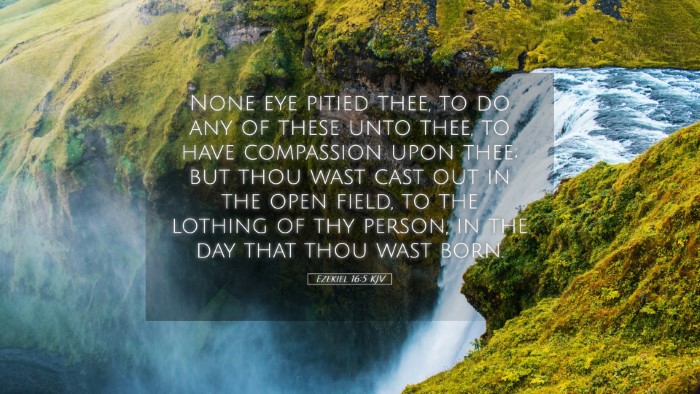Ezekiel 16:5 Commentary
Verse: "No eye pitied thee, to do any of these unto thee, to have compassion upon thee; but thou wast cast out in the open field, to the loathing of thy person, in the day that thou wast born."
Overview
Ezekiel 16:5 presents a stark and vivid image of abandonment and neglect. This verse serves as part of a larger allegorical narrative where God speaks through the prophet Ezekiel about Jerusalem's unfaithfulness and the consequences that follow. Understanding this verse requires a deep dive into the historical, cultural, and spiritual insights provided by various Biblical commentators.
Commentary Insights
Historical Context
The context of this passage is significant. In the time of Ezekiel, Jerusalem faced impending judgment due to its unfaithfulness and idolatry. The language in this verse reflects the shame and degradation associated with abandonment, akin to a helpless newborn cast away without care.
Matthew Henry's Commentary
Matthew Henry emphasizes the lack of compassion shown to the people of Jerusalem. He notes that no one came to their aid in their lowest state. This abandonment symbolizes the spiritual condition of the Israelites, who had turned away from God. Henry articulates that the visual imagery of a cast-out child brings to light the severity of their plight and reflects on God’s grace in choosing to redeem them despite their shortcomings.
Albert Barnes' Analysis
Albert Barnes offers a rigorous examination of the term "cast out" in the context of the ancient Near Eastern customs regarding abandonment, particularly infant exposure. He notes that such practices were a stark reflection of societal norms, where unwanted children were left to die. Barnes points out that this verse outlines the spiritual and moral bankruptcy of the people, illustrating how far they had strayed from God's protective love. Furthermore, he highlights the sovereignty of God in taking the initiative to rescue those whom society deemed worthless.
Adam Clarke's Reflection
Adam Clarke takes a more empathetic approach, speaking to the emotional depth of the situation. He underscores the significance of the phrase "no eye pitied thee," suggesting it represents a profound human failure to show compassion. Clarke draws parallels between the Israelite experience and the broader human condition, emphasizing divine mercy and the transformative power of God’s love. He points out that despite the abandonment, God's commitment to redeem is unshakeable, offering hope to those who feel forsaken.
Theological Implications
This verse and its commentary provide profound theological implications, especially regarding God's nature. It illustrates the contrast between human neglect and divine compassion. The abandonment signifies not just physical neglect but also spiritual desolation—an important reflection for modern believers and church leaders who are called to model God's compassion.
- God's Compassion: Despite the neglect described, God’s willingness to rescue and redeem highlights His unconditional love.
- The Role of the Church: Like God’s initial care for Jerusalem, the Church is called to reflect God’s love through acts of compassion towards the marginalized.
- Identity and Purpose: The verse connects with the identity of believers. Understanding their past as abandoned can lead them to appreciate their current state of being chosen and loved by God.
Conclusion
Ezekiel 16:5 is a poignant reminder of both human frailty and divine grace. The commentaries illustrate the depths of neglect that can occur in human relationships and stand in stark contrast to the God who sees, cares, and ultimately rescues His people. For pastors, students, and theologians, this passage invites reflection on how the message of redemption is woven through the fabric of abandonment, encouraging a mission centered on compassion and restorative love.


